Scallop Season Florida: Essential Guide for Successful Harvests
Scallop season in Florida is a popular and exciting time for both locals and tourists alike. Known for its productive waters and beautiful coastline, Florida is a hotspot for harvesting bay scallops during a specific period annually. The season typically takes place from July to September, depending on the specific county, with varying opening and closing dates. Florida's Gulf of Mexico is a prime location for scalloping, offering unique underwater adventures and memorable experiences to those who participate.
Understanding the intricacies of scallop harvesting, as well as the rules and regulations in place, is vital for a successful and environmentally responsible excursion. Florida Fish and Wildlife Conservation Commission (FWC) manages the scallop populations and sets the regulations each year to protect the species and promote sustainable practices. Recreational scallopers need to possess a Florida saltwater fishing license and adhere to the daily bag limit, while also following proper scallop handling and storage techniques to ensure the highest quality catch.
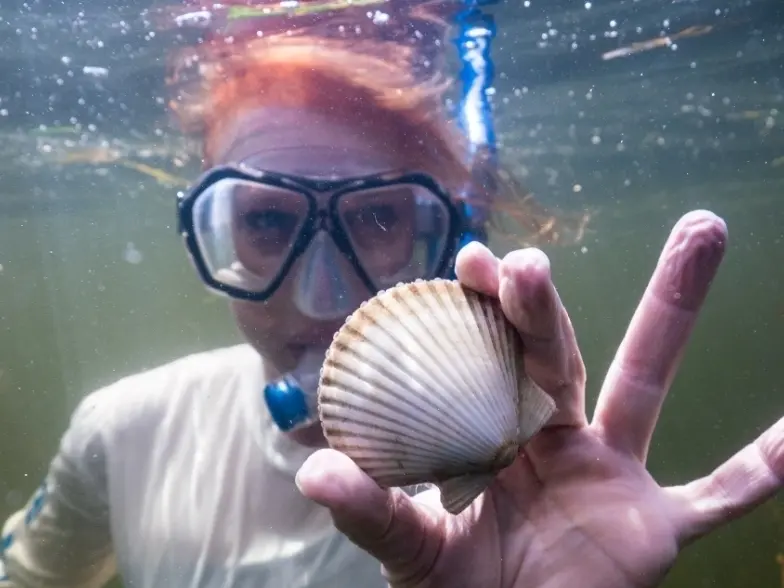
Key Takeaways
- Florida's scallop season takes place in the Gulf of Mexico, typically from July to September, depending on the county.
- A Florida saltwater fishing license and adherence to FWC regulations, including daily bag limits, are required for scallop harvesting.
- Proper handling and storage techniques are essential for maintaining the quality of the catch and promoting sustainable practices.

Understanding Scalloping
Scalloping is a popular recreational activity in Florida, particularly during the scallop season which typically runs from July 1st to September 24th each year. Scallops are bivalve mollusks that are known for their beautiful, distinct shells with ridges and colorful patterns. The main target of scalloping is the bay scallop, which is found in the shallow seagrass beds along the Gulf Coast of Florida.
Scallops are unique creatures with interesting anatomy. One notable feature is their row of blue eyes, which make them stand out among other mollusks. These eyes help scallops detect light and movement in their surroundings, allowing them to escape from potential predators. When disturbed, scallops use their strong adductor muscle to quickly snap their shells shut, propelling them away from danger.
While searching for scallops during the scallop season, keep an eye out for their blue eyes, as this can make it easier to spot them among the seagrass beds. Once you locate a scallop, simply pick it up with your hand or a net and place it into your collection bag. Remember to check the current regulations for scalloping, as there are limits to the number of scallops you can harvest per person and per boat.
When scalloping in Florida, it is crucial to follow all harvesting laws and guidelines to promote a sustainable and healthy scallop population. By participating in scalloping responsibly, you can continue to enjoy this exciting and rewarding activity for years to come.
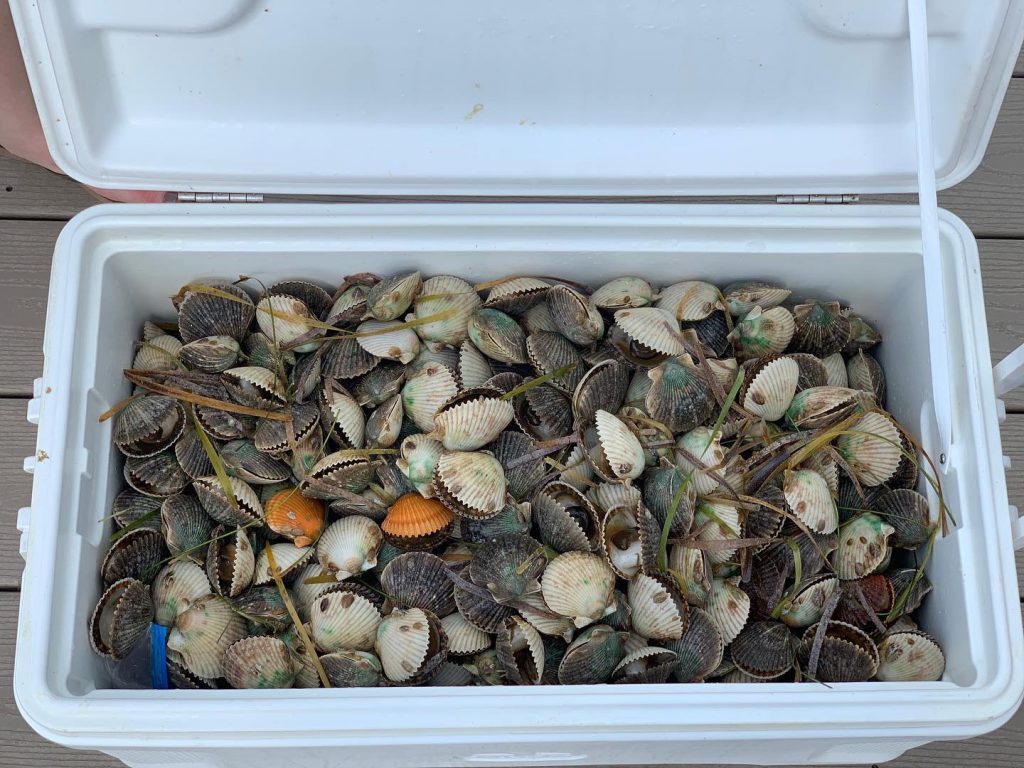
Scallop Season
The Scallop Season in Florida is an annual event that attracts both residents and tourists to harvest Bay Scallops from the state's coastal waters. Bay scallops are marine mollusks that are not only popular for their delicious taste but also for their role in maintaining healthy seagrass beds.
During the 2023 Scallop Season, different regions in Florida will have specific opening and closing dates. For example, St. Joseph Bay and Gulf County will have an open season from August 16th to September 24th, 2023.
To participate in scalloping, it's essential to be aware of the regulations set by the Florida Fish & Wildlife Commission, including the daily bag limit and personal bag limit. The daily bag limit refers to the maximum number of scallops one can harvest within a single day. The personal bag limit is the maximum amount of scallops an individual is allowed to possess at any given time. In general, the maximum of 10 gallons of whole scallops is allowed per vessel for each day during the scallop season.

Adhering to these bag limits is essential to ensure the sustainability of Bay Scallop populations and preserve the delicate ecological balance of Florida's marine habitats. Additionally, scallopers must follow specific harvesting practices, such as only collecting scallops that are within the legal size range and ensuring to harvest them in designated areas.
In summary, the Scallop Season in Florida presents a unique opportunity for marine enthusiasts to engage in a fun and exciting activity. By understanding the regulations and bag limits, scallopers can help maintain the delicate balance of Florida's marine ecosystems and ensure scallops remain a thriving species for future generations to savor and enjoy.

Locations for Scalloping
Scallop season in Florida offers a unique recreational opportunity for residents and visitors alike. Several prime locations scatter across the state's west coast, providing abundant scallops and memorable experiences.
Crystal River stands as one of the best places for scalloping in Florida, boasting optimal water clarity and balance between depth and visibility. This central location along the west coast, makes it easily accessible for most Floridians and offers numerous scallops to be found in just 6 feet of water.
Another popular location is Homosassa, offering picturesque views and a prolific scalloping season. It is an excellent option due to its pristine nature and vast sea grass beds, creating a thriving environment for scallops to inhabit. The area attracts visitors with a desire for a scenic and tranquil scalloping experience.
Levy, Citrus, and Hernando counties are also prime areas for scalloping, with various spots opening their scallop season on July 1st. These areas share the same season timeline, providing ample opportunity during the summer months to dive into the clear waters and harvest scallops.
The Suwannee River and surrounding zones are well-known for their abundant scallop population. The season commences as early as June 15 in this area, offering a head start for those keen to get on the boat and spend a day under the sun, appreciating the natural beauty of the Florida coastline.
In summary, scallop seasoniner enthusiasts have multiple prime locations to choose from throughout Florida's west coast. From the popular Crystal River to the picturesque Homosassa and the diverse waters surrounding the Suwannee River, each area provides abundant scallops and breathtaking experiences for eager divers.

Guide for First-Time Scallopers
Scalloping is a fun and exciting experience for both locals and vacationers in Florida during the summer season. This underwater scavenger hunt allows you to explore the beautiful coastal waters while searching for delicious bay scallops. Here are some tips and essentials for first-time scallopers.
It's crucial to make sure you are well-prepared for your scalloping adventure. Equip yourself with the necessary gear, such as a hat to protect your face from the sun, and a comfortable snorkel and mask to navigate the underwater world. It's also a good idea to have wetsuit gloves for handling scallops, as their shells can be quite sharp.
Safety should be your top priority when out on the water. Stay aware of your surroundings, currents, and tides while you swim. It's recommended to stay close to your group and maintain clear communication using hand signals or other agreed-upon methods. Make sure to keep an eye on the weather and avoid snorkeling during heavy rain or unfavorable conditions.
Florida's scalloping season varies depending on the region, but typically starts around June 15th and lasts until Labor Day or later in some areas, such as Pasco County. Plan your trip according to the season and the weather for the best possible experience.
To have a successful and enjoyable time scalloping, consider joining a scalloping charter. These guided trips provide expert knowledge and resources to maximize your time on the water. Taking part in a charter ensures a smooth experience, they can supply equipment, teach you techniques, and often clean your catch for you at the end of the day.
Keep in mind the legal regulations for scalloping in Florida, such as bag and vessel limits. Familiarize yourself with these rules before your trip to ensure a responsible and fun time on the water. And don't forget your fishing license!
Lastly, remember to respect the marine environment and its inhabitants. Ensure that you only collect the scallops you plan to consume, and leave other marine life undisturbed. Practice sustainable scalloping, and you'll contribute to a healthy ecosystem for future generations to enjoy.

Scallop Harvest Regulations
The Florida Fish and Wildlife Conservation Commission (FWC) is responsible for managing and enforcing regulations pertaining to scallop harvest in Florida. These regulations are designed to protect scallop populations and maintain sustainable harvesting practices in the state's coastal waters.
The Bag Limit refers to the maximum number of scallops an individual is allowed to harvest per day. The current bag limit specified by the FWC is two gallons of whole bay scallops in the shell, or one pint of bay scallop meat per person per day, whichever is reached first. The Vessel Limit restricts the total number of scallops that can be harvested by all the individuals aboard a boat. The current vessel limit is 10 gallons of whole bay scallops or a half-gallon of bay scallop meat, whichever is reached first.
To ensure sustainable scallop populations, certain Closed Areas are designated where scallop harvest is not allowed. The FWC maintains updated information about closed areas and any changes to these designations during the scallop season. It is important for recreational scallopers to be aware of such areas and respect the restrictions.
The Regulations surrounding scallop harvest in Florida include gear requirements, licensing, and restrictions on commercial harvest. Legal gear for scallop harvest includes using hands or a landing/dip net, while commercial harvest is generally prohibited 1. Recreational scallopers are required to obtain a Florida saltwater fishing license unless they meet any exemption criteria or hold a no-cost shoreline fishing license2.
During the scallop season, harvest dates may vary by county3. For example, in 2023, St. Joseph Bay & Gulf County scallop season runs from Aug. 16-Sept. 24. Other counties like Franklin County through northwestern Taylor County have a different season spanning from July 1-Sept. 244. It is essential for harvesters to be aware of the specific dates for their region to ensure adherence to regulations.
Adhering to scallop harvest regulations set by the FWC helps maintain healthy scallop populations and sustainable recreational scalloping opportunities for years to come.
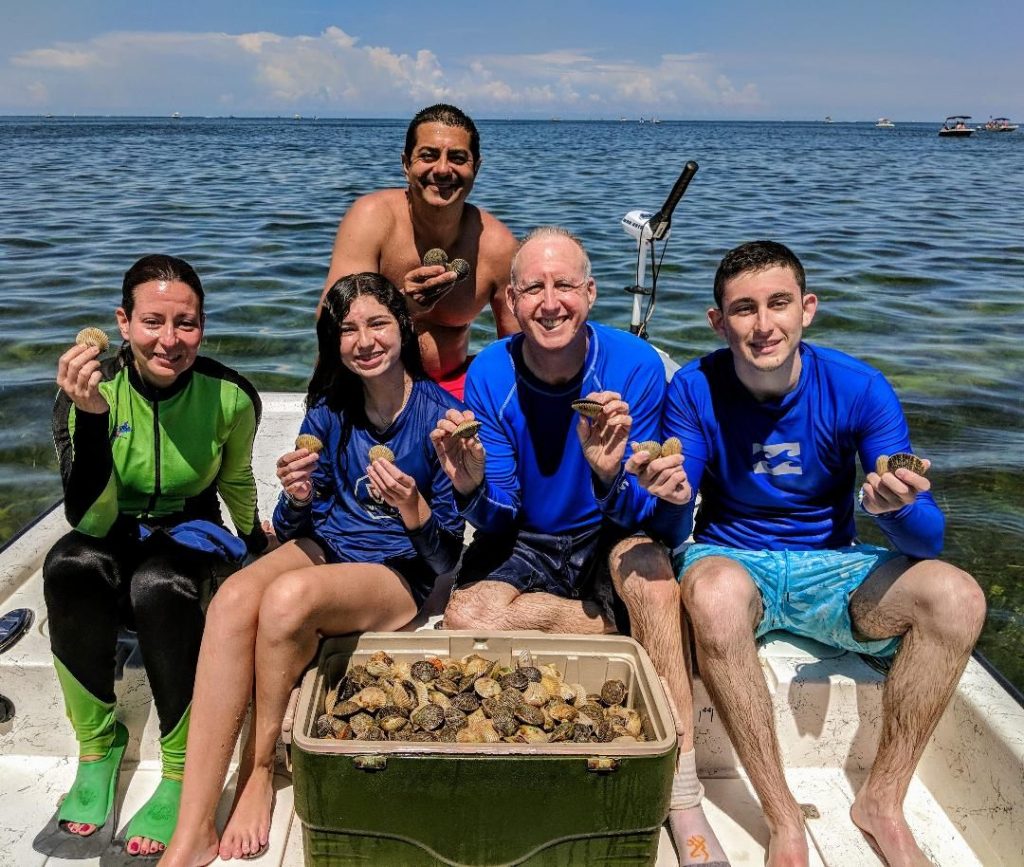
Gearing up for Scalloping
Before embarking on a Florida scalloping adventure, it's essential to have the right gear. This includes masks, fins, gloves, and plenty of ice to keep the scallops fresh once harvested.
A well-fitting mask is crucial for a successful scalloping experience. It should be comfortable and provide a clear view underwater. The mask should also properly seal around the face, preventing water from entering the eyes. Make sure to try on different masks to find the right fit.
Fins are another essential piece of equipment for scalloping. They help swimmers navigate through the water with ease and speed, allowing for efficient searching and collection of scallops. Choose fins that fit snugly but comfortably on the feet, and consider open-heel fins with adjustable straps for optimal fit.
Gloves are recommended for picking up and handling scallops, as their shells may have sharp edges. Wearing gloves not only protects the hands from cuts and scrapes, but also provides better grip, making it easier to handle the scallops.
As scalloping involves swimming and diving in shallow waters, a snorkel can be a useful addition to the gear. It allows for breathing on the water surface while scanning the seabed for scallops. When using a snorkel, invest in one with a purge valve, making it easier to clear any-water entering the snorkel.
Keeping the scallops fresh is vital, especially if planning on enjoying them later. Bring along a cooler with plenty of ice to store the harvested scallops. When placing the scallops in the cooler, make sure to layer them with ice to maintain an optimal temperature.
Equip yourself with the right gear, and you'll have a safe and enjoyable Florida scalloping adventure. Remember that proper preparation is key to making the most of this unique and exciting experience.
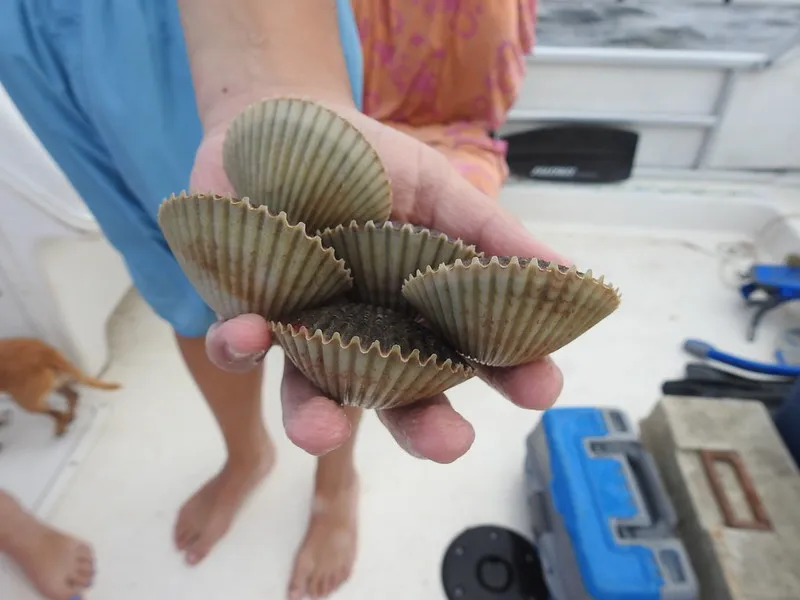
Scallop Handling and Storage
Proper handling and storage of scallops are essential to maintain quality and freshness. One of the best ways to keep your catch fresh during a scalloping trip is to use a combination of ice, a cooler, a mesh bag, and a trash receptacle.
Start by placing a layer of ice in the bottom of a cooler. This will serve as the foundation to keep the scallops chilled. It is important to use a cooler with good insulation to ensure that the temperature stays consistently low throughout the day.
Next, place the collected scallops in a mesh bag, which allows for proper drainage and keeps them separated from the melting ice. To further protect the freshness of the scallops, periodically place the mesh bag on top of the ice layer in the cooler, taking care to refresh the ice as needed.
Using a separate trash receptacle for scallop shells and other debris is crucial to maintain a clean and organized workspace. This also helps to prevent contamination of the scallops with foreign materials or bacteria.
When it's time to transport your scallops home, be sure to maintain the same level of care. Replace any melted ice in the cooler and keep the scallops in a mesh bag to ensure proper air circulation. Transfer them to the refrigerator as soon as possible, where they can be stored for two to three days before cooking or freezing.
In summary, proper handling and storage techniques, such as using a cooler, mesh bags, ice, and a separate trash receptacle, are essential to keep your scallops fresh and flavorful during the scallop season in Florida. By following these simple steps, you can enjoy a delicious and successful harvest with confidence and ease.
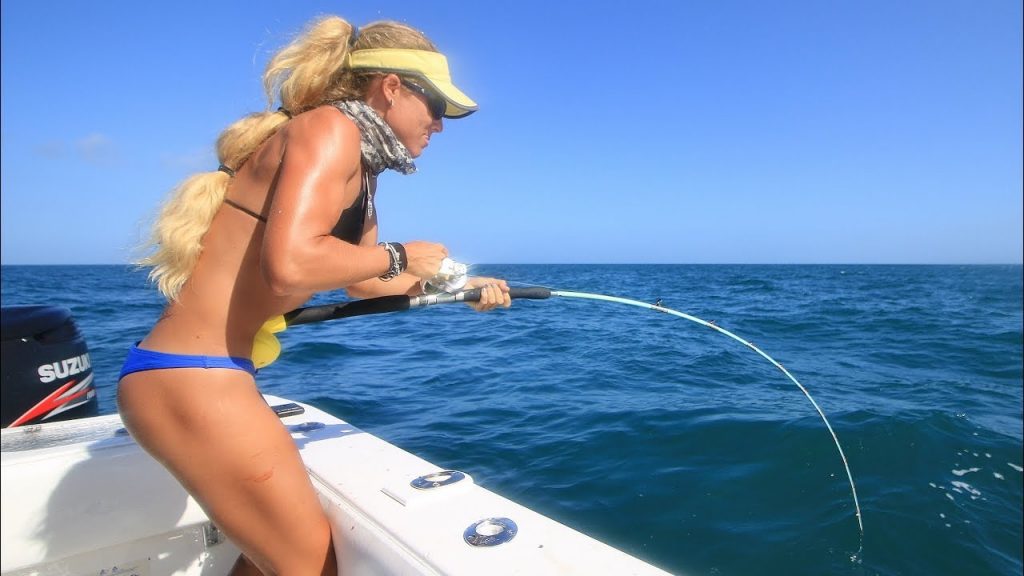
Fishing License Requirements
In Florida, recreational scallop harvesters need a fishing license to ensure legal and sustainable practices. There are two types of licenses they can obtain: the Florida Saltwater Fishing License and the No-Cost Shoreline Fishing License. These licenses cater to different needs depending on the user's mode of harvest.
The Florida Saltwater Fishing License is necessary for most recreational harvesters. This license covers those who collect scallops by hand or use a landing or dip net. However, some individuals may be exempt from needing this license, such as those who are younger than 16, active military members, or residents aged 65 and older. It is essential to review the exemption criteria before engaging in any scalloping activities.
On the other hand, the No-Cost Shoreline Fishing License is an option for those who prefer wading from the shore to collect scallops. This license is valid when one's feet do not leave the bottom to swim during the harvest. Like the Florida Saltwater Fishing License, this license has specific exemptions, so checking the eligibility requirements is vital.
Obtaining a license is a straightforward process and can be done online at GoOutdoorsFlorida.com, in person at a license agent or tax collector's office, or by calling toll-free 888-FISH-FLORIDA (888-347-4356). Always check and verify the requirements based on activity, as well as confirm Florida residency qualifications.
By complying with Florida's fishing license requirements, recreational harvesters can enjoy scalloping while ensuring the protection and conservation of the state's marine resources.
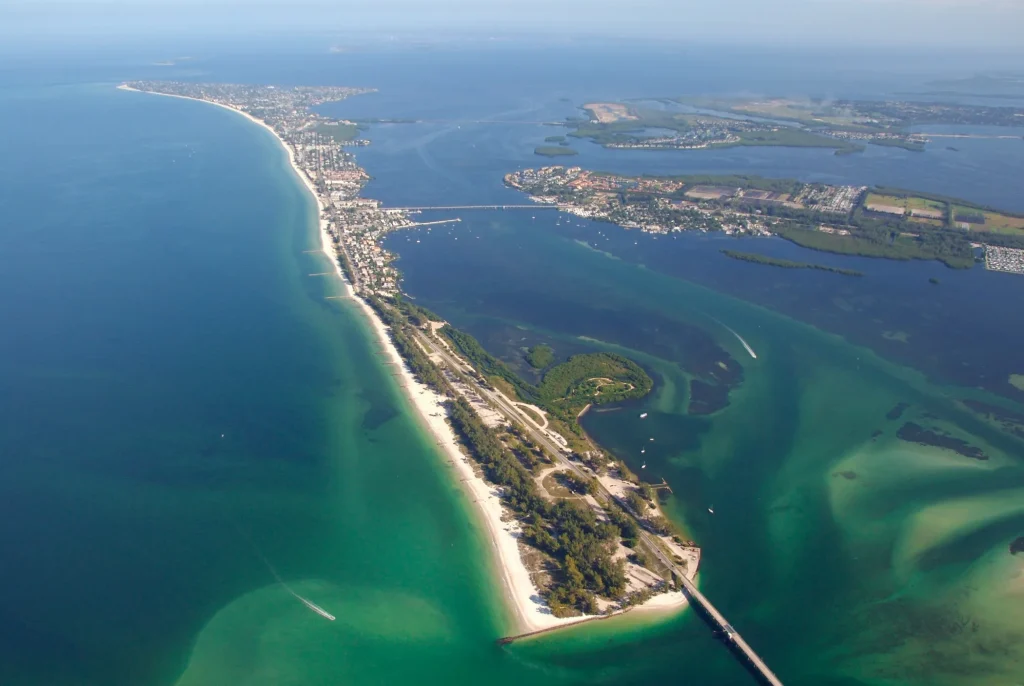
Scallop Restoration and Conservation
Scallop restoration projects in Florida have become a top priority for the Florida Fish and Wildlife Conservation Commission (FWC). They aim to restore the bay scallop population to self-sustaining levels, especially in the Panhandle region. A 10-year restoration project began in 2016, funded by the Deepwater Horizon oil spill restoration money. The goal of this project is to enhance recreational fishing opportunities in the Florida Panhandle.
Bay scallops play a vital role in the marine ecosystem, as they inhabit seagrass beds found in relatively shallow waters, usually 4 to 10 feet deep. These seagrass beds provide essential habitats for various marine wildlife, and maintaining healthy scallop population levels is crucial for preserving these ecosystems.
The Florida bay scallop commercial fishery experienced a decline starting in the 1960s due to several factors such as habitat loss, water quality degradation, and overfishing. The fishery closed in 1994 to safeguard the remaining scallop populations and mitigate further decline. Conservation efforts, including the implementation of strict seasons and bag limitations, are in place to ensure the sustainability of the scallops.
Regulations surrounding scallop harvesting vary depend on location and time of year. For example, St. Joseph Bay and Gulf County have a specific scallop season from August 16th to September 24th. These regulations are strictly enforced and regularly reassessed to adapt to any changes in the scallop populations.
Scalloping in Florida is not only important from an ecological perspective but is also a cherished tradition for native Floridians. Scalloping season draws ample recreational anglers and families to participate in this fun, hands-on fishing experience. By promoting sustainable harvesting practices, everyone can continue to enjoy this coastal tradition for years to come.

Frequently Asked Questions
When does scallop season begin and end in Homosassa?
Scallop season in Homosassa typically starts around July 1st and lasts until Labor Day. However, exact dates may vary from year to year, so it is always best to check with the Florida Fish and Wildlife Conservation Commission for current information.
What are the scallop limits for Florida?
In Florida, scalloping has specific bag limits for both individuals and vessels. Each person is allowed to collect up to 2 gallons of whole bay scallops in the shell or 1 pint of scallop meat. For vessels, the maximum limit is 10 gallons of whole bay scallops in the shell or 1/2 gallon of scallop meat, which is equal to 4 pints. However, individual limits still apply, and each person cannot exceed their personal limit within the vessel limit. For more details on scallop limits and regulations, refer to the FWC's guidelines on bay scallops.
What are the Cape San Blas scallop season dates?
Cape San Blas is located within the St. Joseph Bay and Gulf County scalloping region. For 2023, the season dates in this area are from August 16 to September 24. Please note that these dates may change, and it is essential to verify the current season with the Florida Fish and Wildlife Conservation Commission.
Is a license required for scalloping in Florida?
Yes, a Florida saltwater fishing license is required for residents and non-residents when scalloping. There are options for annual, 5-year, or visitor licenses, depending on your needs. Florida residents who are 65 years old or older, as well as children under 16 years old, are exempt from needing a license. For more information about Florida fishing licenses, visit the FWC's licensing page.
What are the scallop season dates for Pasco County?
For Pasco County, the scallop season dates are not specified in the available search results. It is recommended that interested scallopers visit the Florida Fish and Wildlife Conservation Commission website to obtain the most accurate and up-to-date information regarding Pasco County's scallop season.
Where can I find a map of Florida scalloping locations?
You can find a map of Florida scalloping locations on the FWC's Bay Scallops page. There, you'll find a detailed map displaying the various scallop harvesting zones in Florida, along with their respective season dates and regulations.
Footnotes
- FWC - Bay Scallops: Seasons and Bag Limits ↩
- The Updated 2023 Guide To Florida Scalloping & Regulations ↩
- Scalloping Season In Florida (Updated 2023) - Captain Experiences ↩
- The Updated 2023 Guide To Florida Scalloping & Regulations ↩
Charlie is Editor-in-Chief of Sea Magazine